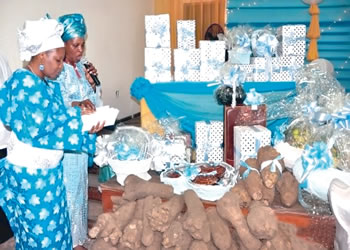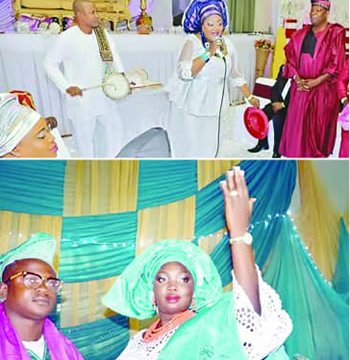The age long traditional marriage ceremony among the Yoruba people has evolved beyond what it used to be; merging civilisation with tradition in a way that ensures that the basic tenets of the culture is not eroded. In this report, YEJIDE GBENGA-OGUNDARE explores the evolution of traditional marriage, the glamour, introduction of alaga iduro/alaga ijoko, excesses and the perceived waste of resources.
Marriage is an important aspect of life among the people of the South-West. Indeed, it is one of the oldest institutions among the Yoruba people and is seen as a symbol of responsibility. In the olden days, issues relating to marriage are not the affair of an individual but a family matter.
Then, the couple, especially the female child, have little or no input in whom they marry or when. And the marriage is a serious matter with laid down steps and cultural procedures; the search and selection of a mate known as Ifojusode, followed by the wall scratching called idegiri, after which comes the acceptance (isiun), application to the family known as itoro, the real betrothal (idana) and the proper wedding (Igbeyawo)
In all these steps, there is always a go-between or chaperone (alarina), that serves as a communication link between the intending couple from the beginning of courtship till the marriage is contracted and the father of the man is the one that approaches the girl’s family irrespective of who searched for the bride; friends, the man himself, a family member or even the parents.
The most important level in marriage is the Itoro and Idana, now known as the introduction and the engagement. Once these two steps are concluded, the marriage is sealed and the couple only waits for the ceremony of the real marriage before the bride is taken to the groom’s home. Today also, the introduction and engagement take place before the civil wedding except in few cases.
At these two events, gift items are presented to the bride’s family. These items include: honey, groundnut cake (adun), kolanut (obi) ranging between 40 to 100 pieces depending on the family, alligator pepper (atare), local wine (oti sekete), palm wine (emu funfun), bitter kola (orogbo) from 42 pieces upwards, yam (isu), between 40 to 100 tubers, salt (iyo), palm oil (Epo pupa).These items all have spiritual and cultural meanings in the Yoruba society.
Though, things have changed with time, the important part of the Yoruba culture has not been eroded and are still observed as important steps in a modern day marriage. Today, the introduction and traditional marriage now called engagement are still very important and gifts are still exchanged.
The Yoruba traditional marriage though a serious affair has been lightened to become a fun-filled and entertaining event. It is now done by professional intermediaries unlike before when it is conducted by women in the family. The new trend which involves the use of contracted professionals called the Alaga ijoko and the Alaga iduro is filled with dancing, comedy and glamour.
Alaga ijoko is the traditional master of ceremony for the bride’s family whose duty is to properly officiate and co-ordinate the proceeding so each provision of tradition is strictly adhered to while Alaga Iduro stands for the groom’s family. These two women ensure that tradition is followed and often they ensure they utilise stages of the event to make family members drop money which they keep for themselves.
Other festivities include presentation of proposal letter, reading of the letter, presentation of letter of acceptance, payment of bride price, collection of engagement gifts, the bride collection of engagement ring, counseling and prayers among many other things though there’s a variation based on individual family and religious affiliations.
Also, the exchange of wedding rings which is alien to the Yoruba tradition has been added as an innovation. The ring is seen as a part of the marital vow while the issue of bride price has been eradicated as families reject this to emphasise the need to take care of their daughter and signify that the new bride is not sold off. Now, unlike before, engagement materials are packaged beautifully to add aesthetic value to the items.
Some have however argued that the glamour and new innovations introduced to Yoruba traditional weddings make many couples spend a lot of money which affect their new home.
Items produced by the groom’s family at the engagement are based on the demands by the bride’s family and their family tradition as well as religion. It may includes foreign drinks, soft drinks, wine, bag of rice, sugar, a box filled with clothes, bag of sugar, bag of salt, alligator pepper, bitter kola, yam, kola nut, honey fruits, and a Bible for Christians and many other things. Also, there may be a bride price which has no fixed amount and has been eradicated by some families. However, some money remain important in all families; Owo Isigba, Owo Ijoko Iyawo, Owo Isiju Owo Baba Gbo, Owo Iya Gbo, Owo Omo okunrin ile, Owo Omobinrin ile, Owo Iyawo Ile, Owo Ijoko Agba, owo Alaga Ijoko. These are not fixed and are negotiable.
As glamorous and interesting as the traditional wedding is today, many people have begun to grumble that it has become a waste of not only resources but time as many groom had complained that it drags and becomes tedious while many brides have gotten late to their churches and civil wedding ceremonies just because the traditional event did not round up on time.
The major complaint however is that the alagas though add glamour to traditional weddings, unnecessarily drag it out to make sure they make so much money while they are more concerned about the money they extort than the interest of the couple.
The excesses exhibited by alagas seems to be common knowledge as people that spoke to Nigerian Tribune, including professional alaga themselves confirmed this. Though not every alaga does this, the percentage that is involved seems to be high and for them, it is about what they can make.
A young woman, Adeola Babalola narrated her experience at a wedding where she was the Chief Bride’s maid. According to her, it took a threat by the groom that he will walk out of the wedding and go on to the hall for the Nikai ceremony before the alaga sat up after holding everyone to ransom for hours.
“It was my friend’s wedding and I was her maid of honour, the engagement was slated for eight in the morning, at the bride’s house at Academy while the Nikai ceremony was to start at noon at a popular Catholic Church hall at Oke Ado before the reception. The alaga is a popular socialite in Ibadan and also hosts a programme on television. The wedding was supposed to be a talk of the town event considering the pedigree of the husband but the excess of the alaga marred the joyful event.
“Though the engagement started a bit behind schedule, it commenced around half past eight, the alaga was not conscious of time. She just continued collecting money from the groom’s family until everyone got fed up and by 11am, she was yet to allow the groom into the venue, not to talk of calling out the bride. When it was 11.30am, the groom had to put a call through to the bride that once its noon, he’s leaving for the Nikai venue whether the engagement ended or not.
In fact, this didn’t bother the alaga who claimed he must persevere since he was there to marry a woman. It took the bride’s threat of entering the venue before the groom was called to make her see the light. She then continued the programme as expected but the event wasn’t beautiful again as the couple were in a foul mood and couldn’t even smile. The programme finally ended around one, an hour after the Nikai should have started. For me, she spoilt their day just for her selfish interest,” she explained.
Another lady, Deborah (surname withheld) that spoke with Nigerian Tribune stated that her sister got late to her church wedding just because the alaga wanted to make money. “The engagement was slated for 7a.m and the church wedding for eleven. But the alaga wasted so much time, asking for owo train, owo plane and such irrelevancies. At a point, she feigned that she was asleep and the groom’s family must use money to wake her, insisting she won’t wake until her assistant told her the money is up to N5000.
“The programme finally ended at 10.30 but before everyone would dress up and go to church, it was late and being an Anglican Church, they started the programme before the bride got there. There was no glorious entrance, my sister scurried in like a thief and the couple and parents got serious scolding from the vicar during the sermon. It was a bad experience,” she said.
The excess of some alagas was confirmed by one of them known as Ariya Suzzy. She stated that it is true that some of them exhibit some selfish interests just to make money.
Undoubtedly, one of the areas where traditional weddings in this part of the country seem to be experiencing a revolution is the use of alaga iduro/ ijoko. Not a few believe that preparations for a regular traditional wedding ceremony is complete without involving these professional comperes.
While the alaga ijoko is seeing to the welfare of the bride’s family, the alaga iduro is defending the groom’s family and pleading for leniency in any area the family is found wanting.
“They provide a sort of comic relief at wedding ceremonies and it’s really fun to have them around though they can be irritants too and may actually task the patience of the audience, especially that of the family members that are on the ‘hot seat’, by their unnecessary demands and waste of ‘precious’ time.” Mr. Pelumi Emmanuel, a clergyman stated.
Church to the rescue
Engagements conducted by the DMS have certain features; they are timely; not expensive as the church has very little demands and do not collect unnecessary fees like owo plane or owo spectacles. Also, the DMS gives any money collected to the bride and only goes away with the evangelism money which is paid into the coffers of the union and is not fixed, it is based on whatever the family that invited the group wants to give.
Speaking on the difference in the DMS conducted marriage and that of the professional contractors, a member of the group, Mrs. Ayo Idowu, told Nigerian Tribune that the church eliminates all unnecessary spendings but does not eradicate the culture in anyway.
“We do not eradicate culture and our programmes are not dull like some think; we go through the stages and the normal steps but we do not collect unnecessary fee like owo plane or spectacles. The bible says that all unrighteousness is a sin, so which plane are we flying or which spectacles are we buying? They think its entertainment but it isn’t, it is mere extortion and unchristian like. We also ensure that the programme is one that will not deplete your resources or blow your budget.
“People from outside even invite us now and we have more demands that we have to plan ahead and often, we work with people in other dioceses to meet up. This shows people are looking beyond the noise and glamour to choose what works and does not stress them,” she said.
But irritating as people find these alagas, they have found an avenue to develop their passion and made extra income from this. Nigerian Tribune investigations revealed that depending on the nature of the wedding and those involved, sometimes the charges range from N20, 000 to N120, 000 besides the extras that will come at the event from the two families and well-wishers in attendance
Though people often complain about the excessiveness of these officials who most times drag and waste just to stylishly extort money from members of the groom and bride’s family, they usually add glamour to wedding ceremonies.
The Yoruba traditional wedding is not just for the bride and groom but a fulfilment of part of culture and tradition in establishing a new family which also affords the two families to come together.
And it is a culture that has defied extinction in the face of innovation, rather it gets more beautiful and glamorous.
A typical Yoruba engagement list
- Box
- Engagement ring
- Envelopes;
(a) Dowry
(b) Owo baba gbo
(c) Owo iya gbo
(d) Owo omo ile
(e) Owo iyawo ile
(f) Owo okunrin ile
(g) Owo obinrin ile
(h) Owo ijoko agba
(i) Owo gate
(j) Owo isiju iyawo
(k) Owo alaga
(l) Owo glass
- Isu – 42
- Orogbo -42
- Obi – 42
- Atare -42
- Adun
- Honey – Two Bottles
- Eja Abori – 42
- One Roll Of Sugar
- Two Baskets Of Fruits
- Assorted Sweets
- Four Crates Of Minerals
- Four Cartons Of Juice
- One Bag Of Rice
- Salt
- Six Fruit Wines
- 1 Keg of Ororo
Additional reports by: Akin Adewakun, Lagos, Hakeem Gbadamosi, Akure, Oluwole Ige, Osogbo
WATCH TOP VIDEOS FROM NIGERIAN TRIBUNE TV
- Let’s Talk About SELF-AWARENESS
- Is Your Confidence Mistaken for Pride? Let’s talk about it
- Is Etiquette About Perfection…Or Just Not Being Rude?
- Top Psychologist Reveal 3 Signs You’re Struggling With Imposter Syndrome
- Do You Pick Up Work-Related Calls at Midnight or Never? Let’s Talk About Boundaries






